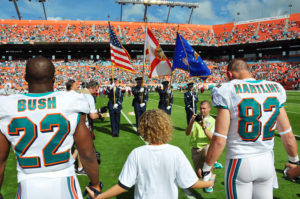
Jason L. Riley in the WSJ cites an artful comment from Barack Obama when critics of the president’s healthcare policies were scolded for being racist. The President responded on David Letterman’s Late Show how important it was to keep in mind “that I was actually black before the election.”
Mr. Obama’s response, classy and amusing, “was based on a certain logic that seems lost on those who are quick to reach for the race card,” writes Mr. Riley.
Brian Flores Was Black When Hired by the Dolphins
Last week, Brian Flores, who was recently fired as head coach of the Miami Dolphins, filed a lawsuit against the National Football League alleging that the league discriminates against black coaches. But Mr. Flores was also black when he was hired.
Professional sports have a long, ugly history of racial exclusion, and Mr. Riley would not randomly dismiss that the Dolphins organization is guilty of discriminatory hiring practices.
But is it plausible? “Dolphins owner Stephen Ross ran the ‘blackest’ organization in the NFL,” sportswriter Jason Whitlock observed in a recent column. “At one time, his head coach, general manager, assistant general manager, defensive coordinator, and several members of his ownership group were all black.” At what point did Mr. Ross become a bigot? When he decided to fire Brian Flores?
Like others who invoke “systemic racism,” Mr. Flores and his allies point to statistical disparities as proof of discrimination. About 70% of NFL players are black, yet the league currently has only two black head coaches and one who has a black father and describes himself as multiracial. In 2003 the league adopted a rule that required teams to interview minority candidates for top coaching jobs. Since then, 122 head coaches have been hired, and all but 17 of them have been white. In recent decades, the number of black head coaches has fluctuated. In 2004 there were five. The number rose to eight by 2011, fell to four in 2013 and then rose back to eight in 2017.
Those numbers may not be as high as some would like, but they don’t look like solid evidence of racist hiring practices.
What is the plausible explanation for the racial imbalance? Could it be it has nothing to do with racial bias?
Progressive icon Ruth Bader Ginsburg spent 27 years on the Supreme Court while hiring only one black law clerk. Was she guilty of discrimination, or was she simply choosing from a pool of candidates that, for whatever reason, included relatively few blacks?
This is no doubt a problem for a league that aspires to have more of the coaches on the sidelines look like the players on the field. But it is not a problem of racial animosity toward blacks who want to coach in the NFL.
Hiring the Best Players
If 70% of the players in the NFL are Black, should not the question be, “Why aren’t there more White players in the NFL?
If you’re willing to fight for Main Street America, click here to sign up for the Richardcyoung.com free weekly email.




